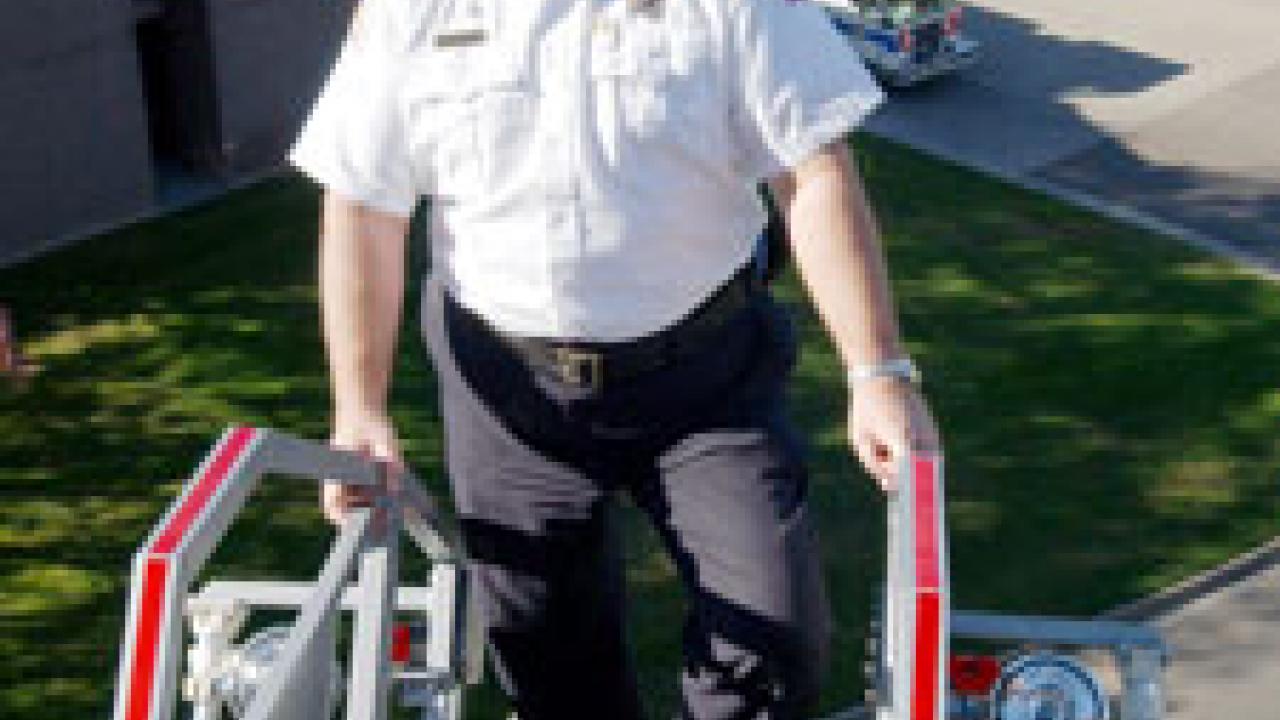After 36 years of fighting fires and preventing them, Mike Chandler plans to relax for at least three months after he retires at the end of November as chief of the UC Davis Fire Department.
He will be honored next week as family, friends and area firefighters celebrate his contributions at a retirement party at -- where else? -- the campus firehouse.
Chandler's interest in the fire service started when he was 12 years old. He remembers riding along with his dad, Herb Chandler, in water truck tankers (now known as tenders) that were used to control noxious weeds along county roads but also used in the 1960s by the Yolo County fire service to assist with wildland fires. Once he enrolled at UC Davis in 1967 he noticed an ad in the student newspaper advertising positions for student firefighters. That formal introduction to the fire service was the start of his professional career at UC Davis.
Chandler has helped build a full service fire department that rivals the complexity of other large metropolitan departments. UC Davis firefighters are trained to handle high-rise fires, hazardous materials, and technical rescue. Their comprehensive training skills make them stand apart from firefighters at other agencies, Chandler said.
"Our fire department has always been on the cutting edge," he said. "In the summer of 1967 we were the first department on the West Coast to get a 100-foot diesel-powered Seagrave ladder truck. The justification was the completion of the nine-story Sproul Hall."
During the 1970s, the UC Davis fire department developed a fire prevention program that was unparalleled at the time. It continues to be one of the hallmarks of the fire service. Men and women assigned to the prevention unit are responsible for fire and life safety regulatory oversight by conducting building inspections, performing plan and submittal reviews and conducting construction inspections -- to ensure compliance with the State Fire Marshal and Office of Statewide Health Planning criteria.
"This campus cannot slack in its prevention phase because we don't have enough resources to fight a major incident," Chandler said. "In the event of a first-alarm in an urban area, a minimum of 50 firefighters would respond to the incident. But at UC Davis the numbers would be far less, which is why we emphasize prevention."
Chandler said he will miss the excitement, camaraderie and community service of the fire department after decades of doing just about everything.
In addition to holding the fire chief post since 1996, he has also served with California's Office of Emergency Services (OES) as Yolo County's operational area fire and rescue coordinator. In that post, Chandler plays a life-and-death-stakes chess game of sorts, maneuvering firefighters and equipment to major emergencies, either within the county or in response to statewide emergencies, like the fires that ravaged southern California recently.
His most challenging moments often come when he is forced to make split-second decisions on where to send resources to fight wildland fires.
"When you have firefighters in the field screaming for more people and equipment, it takes everything you have to maintain control during the chaos."
When he walks out the front door of the fire station on Nov. 26 he has promised his wife that he won't carry his pager or fire radio anywhere -- a habit he has not broken for three decades. What happens after three months? He won't say.
What's it like fighting fires?
I will never forget the Chili Bar fire near Placerville in 1978, which was my first strike team experience. It looked like an atomic bomb had gone off with fire all around. Those experiences are challenging, taxing and humbling. To see the force of nature ripping through huge stands of trees is awe-inspiring.
Firefighters want action on every shift they work. When strike teams are assembled from various agencies to work on large wildland fires, many firefighters can't wait to be assigned.
What is one of your most exciting firefighting memories?
The first time I jumped onto the tailboard of the old fire engine and went on my first emergency response. I was so nervous, my knees began to shake and I was really worried that I would fall off the back of the fire engine. The adrenaline rush was sky high, and my excitement level was off the chart. The practice of riding on the back of fire engines has long been discontinued because of safety reasons.
What hobby do you enjoy?
My only hobby has been the fire service.
What's something people would be surprised to find out about you?
I used to be a bull-rider and actually joined the rodeo circuit for one year. It was one of those whims that you act on when you're young and foolish. I clearly was not very good at it.
What is your most treasured possession?
The pictures I have collected over the years and the cherished memories I have of the people I have associated with in the fire service.
What is your guilty pleasure?
My wife, Randi, and I love to go to San Francisco for an occasional opulent weekend and dine at Morton's and feast on Godiva chocolate cake.
